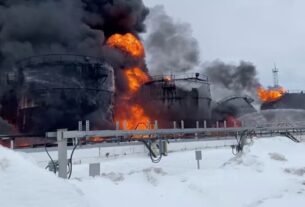Berlin, Germany — As the violence in the Middle East continues to escalate, the German government has issued a stark warning about the risk of the conflict spreading beyond the region, potentially destabilizing global security. The warning comes amid rising tensions following the renewed clashes between Israel and militant groups in Gaza, as well as concerns about broader regional involvement in the ongoing unrest.
In a recent statement, German Chancellor Olaf Scholz emphasized the need for international cooperation to prevent the situation from spiraling out of control. The Chancellor expressed deep concern that without immediate diplomatic intervention, the conflict could draw in neighboring countries and fuel unrest in an already volatile region.
Diplomatic Engagement a Priority
Speaking at a press conference in Berlin, German Foreign Minister Annalena Baerbock echoed the Chancellor’s sentiments, calling for urgent de-escalation efforts and the reinforcement of diplomatic channels. Baerbock stressed that Germany remains committed to working with its European Union (EU) partners, the United Nations (UN), and the United States to push for ceasefires, mediate peace talks, and ensure humanitarian aid reaches those most affected by the fighting.
“We are at a critical juncture where the spread of this conflict could have devastating consequences, not only for the Middle East but for global stability,” said Baerbock. “Germany will continue to advocate for dialogue, restraint, and peaceful solutions. We urge all parties to come to the negotiation table before more lives are lost.”
Regional Powers on High Alert
The German government’s warning reflects a broader concern that the conflict, if unchecked, could provoke a wider war involving regional powers such as Iran, Lebanon, and Syria. Recent reports indicate that Hezbollah, the Lebanese militant group backed by Iran, has stepped up its rhetoric and military preparations, raising fears of a multi-front confrontation with Israel. At the same time, Iran’s influence over various proxy groups across the Middle East has further complicated the situation.
For Germany, the prospect of a full-blown regional conflict could have far-reaching consequences. Not only would such a scenario destabilize the Middle East, but it could also lead to increased refugee flows into Europe, exacerbate global energy shortages, and disrupt international trade routes, particularly if the conflict impacts key oil-producing nations or chokepoints like the Strait of Hormuz.
Humanitarian Concerns and Migration Pressures
Germany, home to one of the largest Middle Eastern diasporas in Europe, is also concerned about the potential for increased refugee migration should the conflict expand. The country has already experienced significant waves of refugees from Syria and other conflict zones in recent years. German officials have warned that any further escalation in the Middle East could displace millions of people, placing additional strain on European migration systems and humanitarian resources.
Interior Minister Nancy Faeser expressed concern over the humanitarian crisis developing in Gaza and other conflict zones in the region. “We must be prepared for a possible surge in refugees fleeing violence,” Faeser said. “Germany stands ready to provide humanitarian aid, but we must also work towards a solution that addresses the root causes of this crisis.”
The German Red Cross has already ramped up its relief efforts, preparing for an influx of displaced persons and coordinating with international aid organizations to deliver essential supplies to affected areas. Hospitals in Germany have also been placed on alert to receive potential patients from the region, particularly those requiring critical care.
German Military and Security Preparedness
On the military front, Germany has thus far ruled out direct involvement in the conflict but remains committed to supporting NATO allies and UN peacekeeping operations. The German Bundeswehr (armed forces) is currently reviewing its capabilities for responding to any spillover from the conflict, including the potential need for evacuations of German nationals in the Middle East and safeguarding critical infrastructure, such as embassies and military bases in the region.
Defense Minister Boris Pistorius reassured the public that while Germany is not considering military intervention, it remains vigilant. “Our priority is the safety of German citizens and personnel abroad,” Pistorius said. “We are closely monitoring the situation, and we are prepared to take action if necessary to protect our interests and allies.”
Impact on Energy Markets and Economy
Germany, like much of Europe, is acutely aware of the potential economic repercussions of the Middle East conflict, particularly on global energy markets. The region is home to some of the world’s largest oil and natural gas reserves, and any disruption in production or transportation could send energy prices soaring, further complicating Europe’s energy crisis following the Russian invasion of Ukraine.
Economists have warned that if the conflict spreads to oil-producing countries like Saudi Arabia or if key shipping routes like the Strait of Hormuz are blocked, the price of oil could spike, pushing the global economy into recession. German industries, heavily reliant on imported energy, would be particularly vulnerable to such disruptions.
Finance Minister Christian Lindner highlighted the need for Europe to diversify its energy sources and strengthen its resilience against global shocks. “We cannot afford to be complacent,” Lindner said. “A prolonged conflict in the Middle East could significantly affect our energy supply and, by extension, our economy. Germany must continue to invest in renewable energy and reduce its dependence on external sources.”
Calls for International Cooperation
Germany’s warning comes as international efforts to mediate the crisis face significant challenges. The U.S. has been leading calls for de-escalation but faces resistance from both Israeli and Palestinian leaderships, each of whom has entrenched positions following years of distrust and failed negotiations. Meanwhile, European leaders are divided over the best course of action, with some favoring stronger sanctions against Iran and other actors seen as inflaming tensions, while others push for immediate diplomatic engagement.
UN Secretary-General António Guterres has called for an immediate ceasefire and urged all parties to allow humanitarian aid to reach civilians caught in the crossfire. “The risk of a wider conflict is very real,” Guterres warned, adding that the international community must act swiftly to prevent further bloodshed.
Germany, alongside France and the UK, has backed these calls, stressing the importance of a unified global response. Chancellor Scholz has scheduled an emergency meeting with EU leaders to discuss potential sanctions, peacekeeping efforts, and additional diplomatic measures.
Conclusion
As the situation in the Middle East grows more precarious, Germany’s government is sounding the alarm on the potential for the conflict to spread and destabilize not only the region but the world. With its strong diplomatic stance, focus on humanitarian efforts, and emphasis on international cooperation, Germany is positioning itself as a key player in the global response to the crisis. However, much remains uncertain, and the coming weeks will be critical in determining whether the conflict can be contained or if it will spiral into a broader geopolitical catastrophe.





